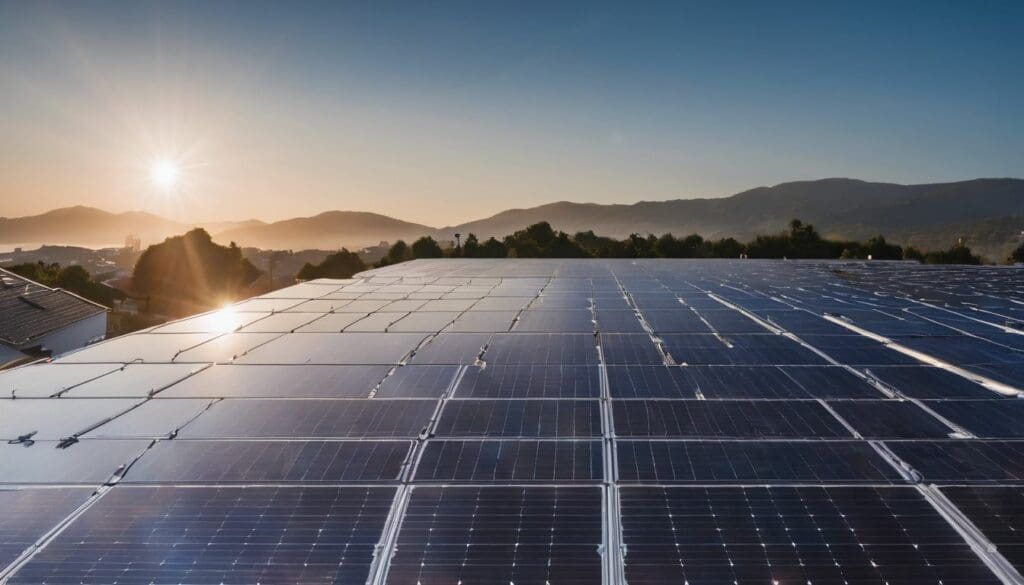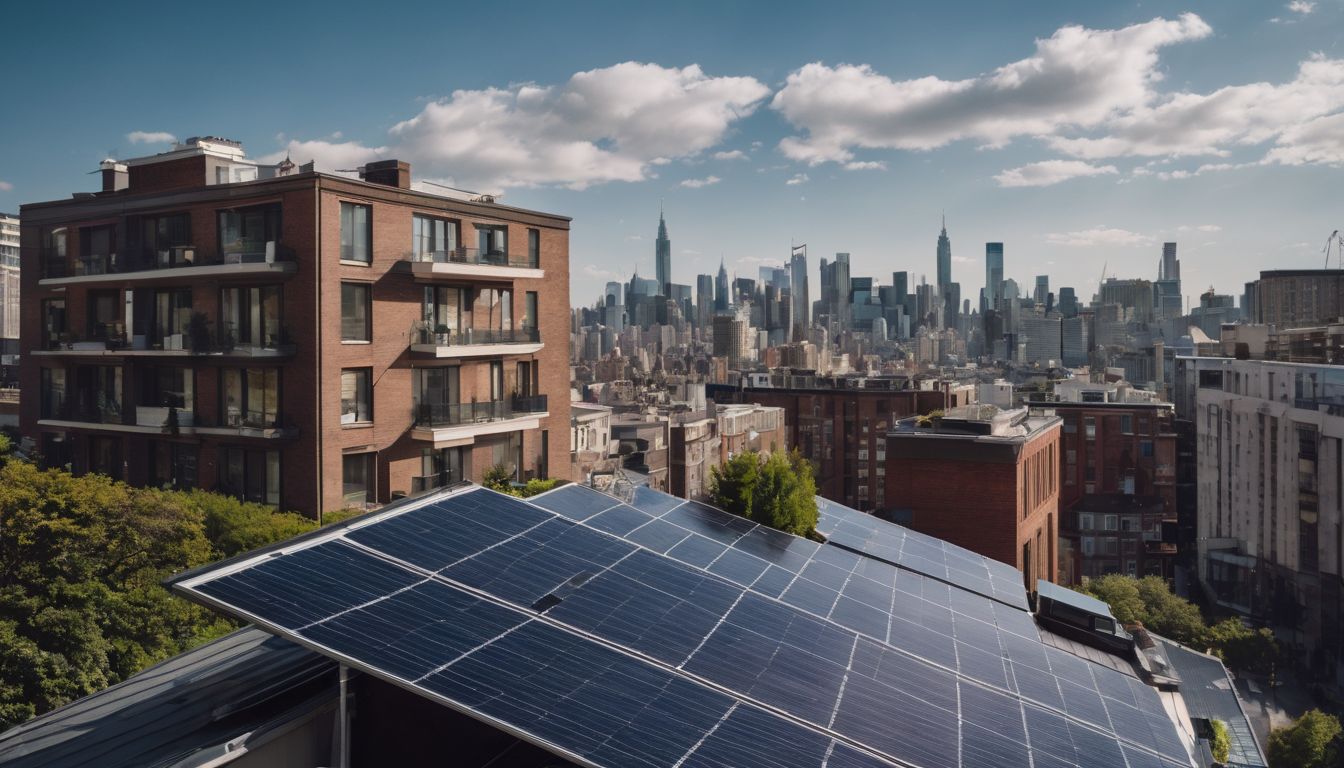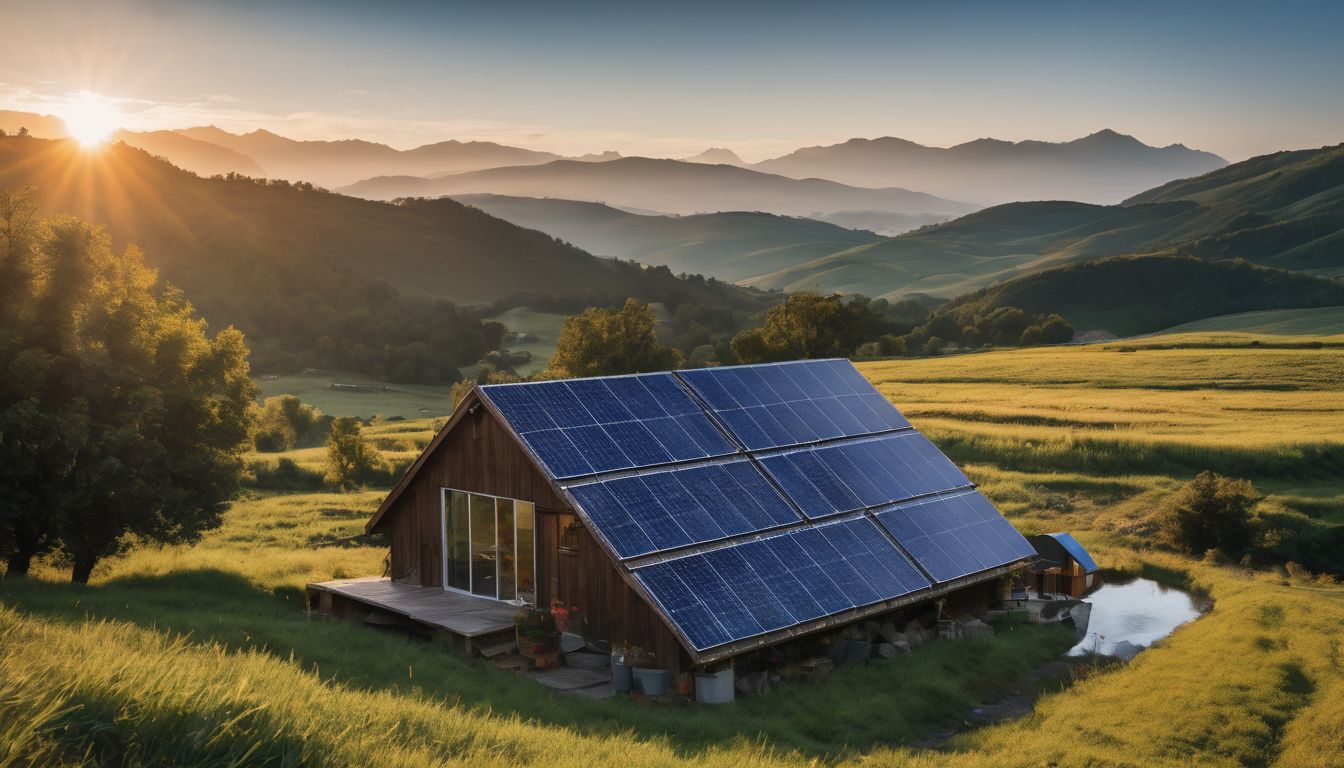As energy bills soar, many of us feel the pinch. Solar energy is on the rise, with installations increasing worldwide each year. This blog will unveil how harnessing the sun’s power can lead us towards a future where we aren’t tied down by traditional energy sources.
Keep reading to discover a brighter tomorrow!
Key Takeaways
- Solar energy reduces the need for imported fossil fuels, leading to greater political and economic stability.
- Installing solar panels and utilising home energy storage systems can significantly cut down on electricity costs and carbon emissions.
- Advancements in technology are making solar power more efficient, affordable, and a key player in achieving a sustainable future.
- Decentralised power production through solar energy lessens the likelihood of widespread power outages during emergencies or grid failures.
- By shifting towards solar energy, individuals gain control over their own power supply, fostering national security and contributing to environmental sustainability.
What is Energy Independence?
Energy independence means being able to meet a nation’s energy needs without relying on imports from other countries. It is important for reducing vulnerability to supply disruptions and price fluctuations in the global energy market.
Definition
Energy independence means a country can meet its power needs without relying on imported fuels. It’s the freedom from having to buy oil, coal, or natural gas from other countries. This self-reliance is crucial for political and economic stability.
Using renewable energy sources like solar power plays a big part in achieving this goal. Solar panels harness sunlight to generate electricity directly. By tapping into this clean energy source, nations reduce their greenhouse gas emissions and cut down on fossil fuel use.
Secure and sustainable, solar energy moves us closer to a self-sufficient future.
Importance
To achieve energy independence through solar power is crucial for ensuring a stable and sustainable energy future. By reducing reliance on fossil fuels, we can secure a green and renewable power source that decreases our carbon footprint.
This helps to not only stabilise national security but also ensures supply stability and tax credits. Solar energy promotes the concept of environmental self-sufficiency, providing utility rate stability and flexibility in electricity generation.
Solar battery storage advances energy security by offering consistent power even during outages, thus promoting sustainable and green energy practices which are vital for both our environment and economy.
How Can Solar Energy Contribute to Energy Independence?
Solar energy can contribute to energy independence by reducing reliance on fossil fuels, decreasing power outages, providing political flexibility, stabilising energy prices, and increasing sustainability.
Reduced reliance on fossil fuels
Solar energy reduces reliance on fossil fuels, decreasing carbon emissions and air pollution. It diminishes the need for coal, oil, and natural gas as primary sources of power generation.
This shift promotes a cleaner environment, helping to combat climate change and preserve natural resources for future generations.
Shifting away from fossil fuels towards solar energy ensures less dependence on imported oil and gas, contributing to national energy security. Through this transition, individuals can take an active role in reducing their carbon footprint while promoting sustainable energy independence.
Decreased power outages
Decreased power outages improve reliability, essential for a sustainable energy system. Solar power offers localised electricity generation, reducing the risk of widespread blackouts during extreme weather events or grid failures.
By diversifying the energy mix with solar, communities can maintain essential services and minimise disruptions.
Solar panels provide a dependable source of electricity and enhance grid resilience by decentralising power production. This distributed generation approach reduces strain on the central grid infrastructure and decreases vulnerability to outages, creating more stable and secure energy systems for environmentally conscious individuals to support.
Political flexibility
Political flexibility is a crucial aspect of achieving energy independence through solar power. By diversifying our energy sources, we reduce our reliance on foreign energy supplies and the political volatility that comes with it.
This enables us to have greater control over our own energy future, reducing vulnerability to geopolitical tensions and ensuring a more stable and secure national energy supply.
Furthermore, embracing solar energy fosters a more diversified and resilient domestic energy portfolio. The ability to generate power at the local level provides communities with greater autonomy in managing their electricity needs, thus lessening dependence on centralised fossil fuel infrastructure.
This not only bolsters resilience in times of crises but also empowers decision-making at the local level.
Stable energy prices
Shifting to solar energy can stabilise energy prices. This means less vulnerability to fluctuations caused by geopolitical tensions, supply disruptions, or changes in demand. Solar energy also offers predictability and protection against rising utility rates.
By harnessing the power of the sun, individuals can insulate themselves from the uncertainty of traditional energy markets and achieve greater control over their energy expenses.
In addition to protecting against unpredictable price spikes, solar energy contributes to stable pricing structures for consumers. As more people adopt solar solutions, the overall abundance of cleaner and renewable electricity grows, mitigating cost volatility and promoting long-term stability.
Increased sustainability
Moving from stable energy prices to increased sustainability, it’s important to recognise how solar energy contributes to a more sustainable future. Solar power reduces our reliance on non-renewable resources, helping decrease carbon emissions and combat climate change.
By harnessing the sun’s energy, we can pave the way towards a cleaner environment and a greener planet for generations to come.
With solar cells converting sunlight into electricity without producing harmful emissions, embracing solar energy is a crucial step in promoting environmental conservation. The shift towards sustainable practices not only benefits us now but also ensures a brighter future for our planet by reducing our carbon footprint and fostering greater self-sufficiency in meeting our energy needs.
Benefits of Achieving Energy Independence with Solar Energy
– Achieving energy independence with solar energy leads to reduced utility rate increases and price stability, as well as a decreased carbon footprint and improved national security.
Reduced utility rate increases
Solar energy contributes to reduced utility rate increases by providing a stable and predictable source of power. As more homes and businesses harness solar energy, the demand for traditional utility-generated electricity decreases, leading to lower overall costs.
Additionally, with incentives and tax credits for solar installation, individuals can further reduce their reliance on costly grid-supplied power, resulting in long-term financial benefits.
By decreasing the burden on traditional utility companies, solar energy empowers individuals to take control of their energy consumption and expenditure. This shift towards sustainable power not only benefits individual consumers but also promotes environmental conservation and supports national efforts towards achieving energy independence.
Price and supply stability
Solar energy provides price and supply stability by reducing dependence on fluctuating fossil fuel prices. This stability is achieved through consistent energy production from solar panels, ensuring a reliable power supply for homes and businesses.
By harnessing the sun’s energy, individuals can mitigate the impact of rising utility rates, contributing to a more stable and predictable energy landscape.
Additionally, solar power allows for greater control over energy costs by producing electricity on-site. This reduces vulnerability to external factors that affect traditional energy sources, providing a more secure and stable supply for environmentally conscious individuals seeking sustainable solutions.
Decreased carbon footprint
By switching to solar energy, individuals can significantly reduce their carbon footprint. Solar power generates electricity without producing greenhouse gas emissions, which helps combat climate change and reduces air pollution.
This shift towards renewable energy sources fosters a cleaner and greener environment, aligning with the values of environmentally conscious individuals who support conservation and environmental sustainability.
Incorporating solar energy into daily life not only reduces reliance on traditional fossil fuels but also plays a pivotal role in decreasing overall carbon emissions. With solar power, households contribute to a healthier planet by minimising their environmental impact.
Improved national security
By reducing our carbon footprint through the use of solar energy, we can also contribute to improved national security. This is because solar power decreases our reliance on imported fossil fuels, allowing us to have more control over our energy supply and making us less vulnerable to geopolitical uncertainties.
Additionally, a diversified energy mix that includes solar power provides greater stability in the face of potential disruptions, contributing to a more secure and resilient energy infrastructure.
Moreover, embracing solar energy means enhancing grid reliability and resilience, which safeguards against potential threats such as cyber-attacks or natural disasters. By investing in sustainable and domestically-sourced energy solutions like solar power, we can bolster our country’s overall security while also promoting environmental protection and conservation efforts.
Steps to Achieving Energy Independence with Solar Energy
Installing solar panels, utilising home energy storage, and choosing the right solar panel setup are essential steps towards achieving energy independence with solar energy. To learn more about how these steps can help you become more self-sufficient in your energy usage, read on!
Installing solar panels
Solar panels are a key component in harnessing the power of solar energy to achieve energy independence. By strategically placing solar panels on rooftops or in open areas, individuals can actively generate their own clean and renewable electricity.
This reduces their reliance on traditional grid-based power sources and decreases their carbon footprint, contributing to a more sustainable and environmentally friendly future.
When investing in home energy solutions, it’s important to consider the optimal placement and size of solar panels. Additionally, choosing high-quality equipment will ensure efficient energy production while maximising the benefits of energy independence.
Utilising home energy storage
Home energy storage systems, such as solar batteries, play a crucial role in achieving energy independence and sustainability. By harnessing excess solar power during the day, these batteries store energy for later use, reducing reliance on the grid.
This ensures a consistent power supply even during outages and peak demand periods. Home energy storage also promotes self-sufficiency by allowing households to utilise their own generated renewable energy throughout the day and night.
Furthermore, home energy storage contributes to stabilising overall electricity costs while reducing carbon emissions. Investing in this technology not only benefits individual households but also supports broader environmental conservation efforts, promoting a greener and more sustainable future for all.
Choosing the right solar panel setup
When selecting a solar panel setup, consider factors such as energy needs, available space, and budget. Assess your household’s energy requirements to determine the size and type of solar panels needed for optimal efficiency.
Additionally, evaluate the available sunlight exposure on your property to position the panels for maximum sun exposure throughout the day. It is also crucial to choose high-quality solar batteries for efficient energy storage during low-light periods or power outages.
When deciding on a solar panel setup, it’s essential to consult with reputable suppliers who can offer expert advice on system design and installation. Look for certified installers and ensure that they use durable mounting equipment suitable for your roof type or ground installation.
The future of solar energy
As solar technology continues to advance, the future of solar energy looks promising. Innovations in solar panels and storage solutions are making solar power more efficient and cost-effective.
Additionally, research and development into new materials and designs are driving down the production costs of solar panels, making them more accessible to a wider range of consumers.
The integration of smart grid technology also holds enormous potential for maximising the use of solar energy by allowing for better communication between energy providers and consumers.
Looking ahead, advancements in battery storage technology will play an essential role in enhancing the viability of solar power as a primary source of energy. With continued investment and innovation, the future indeed seems bright for furthering our reliance on clean, sustainable power sources like solar energy.
Conclusion
In conclusion, solar energy is a crucial contributor to achieving energy independence. It reduces reliance on fossil fuels and enhances stability in power supply. Solar energy also promotes sustainability, offers stable prices, and strengthens national security.
Embracing solar energy opens the door to a future of self-sufficiency and resilience in our energy needs.
FAQs
1. What does solar energy do for energy independence?
Solar energy reduces reliance on fossil fuels by providing an alternative source of power, which can lead to greater energy self-sufficiency for homes and businesses.
2. Can solar panels make my home more energy efficient?
Yes, installing solar panels can significantly increase your home’s energy efficiency by harnessing the sun’s power to generate electricity.
3. How does a solar battery help with energy independence?
A solar battery stores excess solar power for later use, ensuring a continuous supply of electricity even when the sun isn’t shining, aiding in achieving complete energy independence.
4. Will using solar energy mean I no longer need other forms of fuel?
While adopting solar technology greatly reduces dependence on traditional forms of fuel like coal or gas, it contributes as part of a larger move towards using renewable and alternative energies for comprehensive sustainability.





